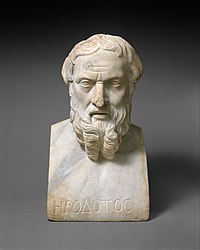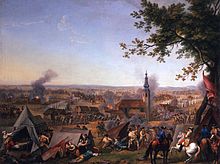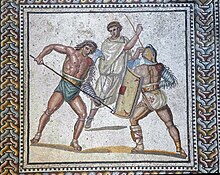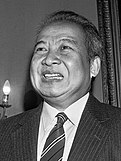Portal:History
The History Portal

Herodotus (c. 484 BC – c. 425 BC) is often
considered the "father of history"
History (derived from Ancient Greek ἱστορία (historía) 'inquiry; knowledge acquired by investigation') is the systematic study and documentation of human past. History is an academic discipline which uses a narrative to describe, examine, question, and analyze past events, and investigate their patterns of cause and effect. Historians debate which narrative best explains an event, as well as the significance of different causes and effects. Historians debate the nature of history as an end in itself, and its usefulness in giving perspective on the problems of the present.
The period of events before the invention of writing systems is considered prehistory. "History" is an umbrella term comprising past events as well as the memory, discovery, collection, organization, presentation, and interpretation of these events. Historians seek knowledge of the past using historical sources such as written documents, oral accounts or traditional oral histories, art and material artifacts, and ecological markers. History is incomplete and still has debatable mysteries.
Stories common to a particular culture, but not supported by external sources (such as the tales surrounding King Arthur), are usually classified as cultural heritage or legends. History differs from myth in that it is supported by verifiable evidence. However, ancient cultural influences have helped create variant interpretations of the nature of history, which have evolved over the centuries and continue to change today. The modern study of history is wide-ranging, and includes the study of specific regions and certain topical or thematic elements of historical investigation. History is taught as a part of primary and secondary education, and the academic study of history is a major discipline in universities.
Herodotus, a 5th-century BCE Greek historian, is often considered the "father of history", as one of the first historians in the Western tradition, though he has been criticized as the "father of lies". Along with his contemporary Thucydides, he helped form the foundations for the modern study of past events and societies. Their works continue to be read today, and the gap between the culture-focused Herodotus and the military-focused Thucydides remains a point of contention or approach in modern historical writing. In East Asia a state chronicle, the Spring and Autumn Annals, was reputed to date from as early as 722 BCE, though only 2nd-century BCE texts have survived. The title "father of history" has also been attributed, in their respective societies, to Sima Qian and Ibn Khaldun. (Full article...)
Featured picture
Did you know (auto generated)

- ... that neurologist Christopher J. Boes has discussed the history of treating headaches without drugs?
- ... that Yesenia Yarhui, the youngest parliamentarian in Bolivian history, was sworn into the Chamber of Deputies at just 19 years old?
- ... that although Ronteza slipped and fell chasing a cow in competition, she made Arabian horse history?
- ... that the Hawaii Civil Liberties Committee was designated as a Communist front by the House Un-American Activities Committee?
- ... that the government of Victoria, Australia, has a program to remove 110 level crossings by 2030, the fastest rate in the state's history?
- ... that the Irish Bee Conservation Project is helping to rewild native bees with bee lodges on the estate of the historic Dunsany Castle?

Ima Hogg (July 10, 1882 – August 19, 1975), known as "The First Lady of Texas", was an American society leader, philanthropist, mental health advocate, patron and collector of the arts, and one of the most respected women in Texas during the 20th century. Hogg was an avid art collector, and owned works by Picasso, Klee, and Matisse, among others. Hogg donated hundreds of pieces of artwork to Houston's Museum of Fine Arts and served on a committee to plan the Kennedy Center in Washington, D.C. An enthusiastic collector of early American antiques, she also served on a committee tasked with locating historical furniture for the White House. She restored and refurbished several properties, including the Varner plantation and Bayou Bend, which she later donated to Texas arts and historical institutions who maintain the facilities and their collections today. Hogg received numerous awards and honors, including the Louise E. du Pont Crowninshield Award from the National Trust for Historic Preservation, the Santa Rita Award from the University of Texas System, and an honorary doctorate in fine arts from Southwestern University.
Hogg was the daughter of Sarah Ann "Sallie" Stinson and James Stephen "Big Jim" Hogg, later attorney general and governor of the state. Ima Hogg's first name was taken from The Fate of Marvin, an epic poem written by her uncle Thomas Hogg. She endeavored to downplay her unusual name by signing her first name illegibly and having her stationery printed with "I. Hogg" or "Miss Hogg". Although it was rumored that Hogg had a sister or sisters, whose names were suggested to be "Hoosa Hogg", "Ura Hogg" or "Wera Hogg", she had only brothers. Hogg's father left public office in 1895, and soon after, her mother was diagnosed with tuberculosis. When Sarah died later that year, Jim Hogg's widowed elder sister moved to Austin to care for the Hogg children. Between 1899 and 1901, Hogg attended the University of Texas at Austin; she then moved to New York City to study piano and music theory for two years. After her father's death in 1906, she traveled to Europe and spent two years studying music under Xaver Scharwenka in Vienna. When she returned to Texas, she established and managed the Houston Symphony Orchestra and served as president of the Symphony Society. (Full article...)On this day
September 24: Heritage Day in South Africa; Independence Day in Guinea-Bissau (1973)
- 1645 – English Civil War: Royalists commanded by King Charles I suffered a significant defeat at the Battle of Rowton Heath.
- 1869 – Jay Gould, James Fisk, and other speculators plotted but failed to control the United States gold market, causing prices to plummet.
- 1890 – Wilford Woodruff, the president of the Church of Jesus Christ of Latter-day Saints, wrote the first draft of a manifesto that officially disavowed the future practice of plural marriage.
- 1941 – Operation Barbarossa: A Wehrmacht training event known as the Mogilev Conference began, marking an increase in violence against Jews and other civilians in the areas under General Max von Schenckendorff's command.
- 1993 – Norodom Sihanouk (pictured) became King of Cambodia with the restoration of the monarchy after a 23-year interregnum.
- Pope Liberius (d. 366)
- Howard Florey (b. 1898)
- Esther Eng (b. 1914)
- Princess Victoria of Hesse and by Rhine (d. 1950)
Selected quote
Even death is not to be feared by one who has lived wisely.
— Gautama Buddha, founder of Buddhism
Related portals
More Did you know...
- ... that the Soviet Tupolev Tu-142 (pictured) maritime patrol aircraft was developed in response to the American UGM-27 Polaris submarine-launched ballistic missile?
- ... that Harry Powers said that watching his victims die was more fun than a brothel?
- ... that the effort put forth by the subject of Miró's 1937 Naked woman climbing a staircase and her heavy limbs are thought to reflect the tragedy of the Spanish Civil War?
- ... that 49% of German military losses happened in the last 10 months of the Second World War in Europe?
- ... that Thomas Edison lost a fortune in his ore-milling company, but "had a hell of a good time spending it"?
- ... that American McCaull Comic Opera Company actress May Yohé, once the owner of the Hope Diamond, died poor?
- ... that Egyptian political cartoonist Ahmad Nady took part in the 2011 Egyptian revolution, drawing cartoons while he demonstrated?
- ... that finds unearthed at the Israelite Tower in Jerusalem's Jewish Quarter attest to the Babylonian sack of the city in 586 BCE?
Topics
Categories

History • By period • By region • By topic • By ethnic group • Historiography • Archaeology • Books • Maps • Images • Magazines • Organizations • Fictional • Museums • Pseudohistory • Stubs • Timelines • Chronology • People • Wikipedia historians
WikiProjects
![]() WikiProject History •
Ancient Near East • Australian History • Classical Greece and Rome • Dacia • Former countries • History of Canada • Chinese history • European history • Heraldry and vexillology • Indian history • Jewish history • Medieval Scotland • Mesoamerica • Military history • Middle Ages • History of Science
WikiProject History •
Ancient Near East • Australian History • Classical Greece and Rome • Dacia • Former countries • History of Canada • Chinese history • European history • Heraldry and vexillology • Indian history • Jewish history • Medieval Scotland • Mesoamerica • Military history • Middle Ages • History of Science
WikiProject Time • Days of the Year • Years
WikiProject Biography • Composers • Political figures • Saints • United States Presidents
Things you can do
 |
Here are some tasks awaiting attention:
|
Associated Wikimedia
The following Wikimedia Foundation sister projects provide more on this subject:
-
Commons
Free media repository -
Wikibooks
Free textbooks and manuals -
Wikidata
Free knowledge base -
Wikinews
Free-content news -
Wikiquote
Collection of quotations -
Wikisource
Free-content library -
Wikiversity
Free learning tools -
Wiktionary
Dictionary and thesaurus


















































